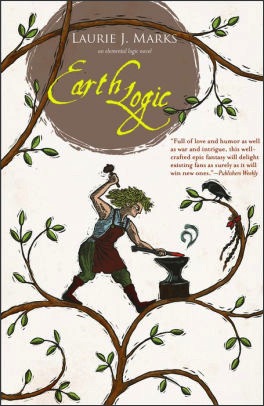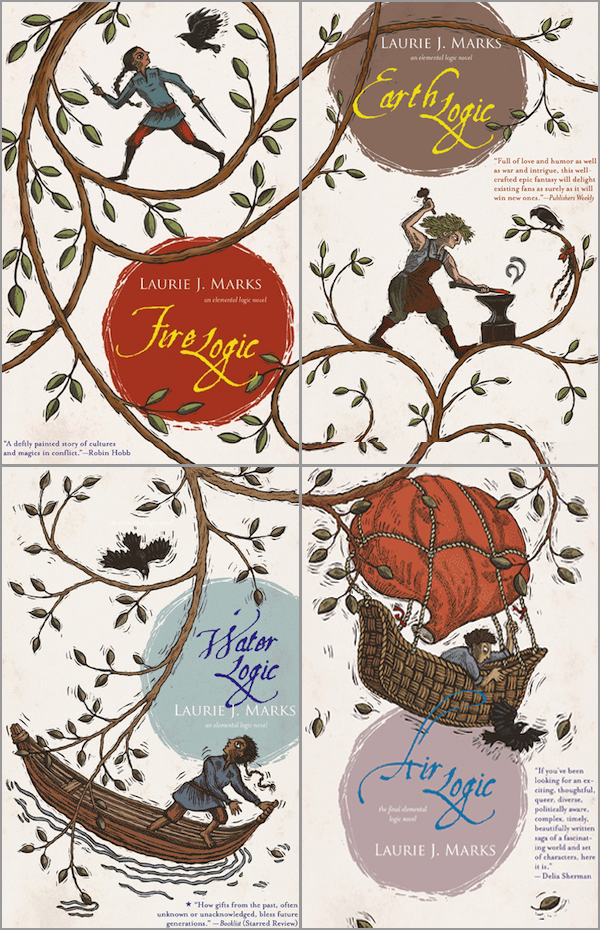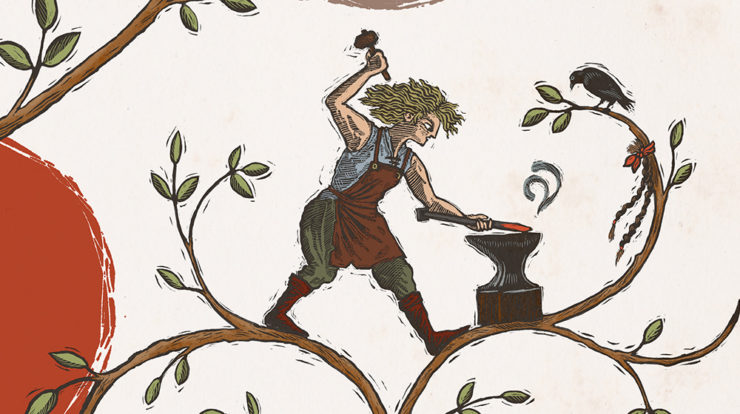At the close of Fire Logic, Karis has confronted Councilor Mabin and driven a spike into her heart—without killing her—as a symbolic display of authority and earth-elemental magics. In so doing, surrounded by her found family and allies, she declares herself known as the successor to Harald G’deon and the leader of their nation. However, Karis and her councilors-slash-kin aren’t necessarily prepared emotionally or personally to take over the ruling of a country. When to act, and what to do when it’s time, remains a burning question for a people at war—one that none of our protagonist are quite sure how to answer.
Fire Logic’s deeply humanist approach to realism in the political fantastic continues unabated in Earth Logic, a novel concerned first and foremost with ending the war that’s been grinding the Shaftali and Sainnese people to dust for more than a decade. The central question of Earth Logic is, how does a protracted conflict end without either side’s annihilation? Marks’s conclusion, as explored by our protagonists, is that domination must be purposefully exchanged for domesticity and a collective consciousness forged as a result.
The living discipline of hope, a stalwart and productive optimism, opened various characters’ eyes to a better possible future in the first novel. In the second, the work starts toward that vision, clumsy and fractious and faced with troubles on all sides. Famine, plague, and retaliatory skirmishes explode across the nation of Shaftal and outside its borders, enough to keep Karis traversing the land like a wandering healer instead of a head of government. Karis describes the precarity she feels and the reason she’s been frozen to inaction through a metaphor later in the book: she’s like a cook carrying an overloaded serving tray with one last heavy item to balance on it exactly right, at the risk of sending everything crashing to the ground.
She herself is the heavy item. The pressure of necessary inaction, in the face of Zanja making an ultimate sacrifice in a burst of fire logic, drives Karis to misery at her duties. Emil, too, suffers on their behalf as part of the cost of driving progress forward. All of our expansive cast—which continues to grow throughout this dense, lengthy, complex narrative—are fully realized, fully human characters. It makes their pain more of an agony to read. And while Emil, Zanja, and Karis are still central protagonists this time around, they’re also heads of state in their way…and Marks shifts much of the narrative away from their leadership to the support structures surrounding them.
The cook Garland, a Sainnite who fled from his garrison and falls in with Karis and the gang, is a prime example of Marks’s attention—as mentioned last time around—to the “women’s work” (though it’s anything but) so often ignored in these types of novels. The care of children, the preparation of food, the maintenance of a home: without all of these, a society does not function. Garland’s role as a quiet, skilled cook is far more than background. He is perhaps the most integral member of the group once he makes his home with them, providing sustenance, counsel, warmth. He is implacable in his way, too, with the occasional lecture to keep Karis in line and feeding herself. Gender, once again, is not erased in the act of creating radical egalitarianism in the text. It’s present and considered, interwoven.
Buy the Book


Earth Logic
Food is, in fact, exceedingly important to Earth Logic—as are stories. The central motif of relinquishing domination for the domestic is embodied in the act of sharing: of crafting a thing and giving it, of receiving the thing given, of the exquisite intimate kindness of communality. Zanja’s stories, Medric’s book, and Garland’s kitchen are as much or more the sites of revolution as the violent skirmishes that pepper the text. The battles are relics of the past. Willis raising a false “lost G’deon” narrative to justify an attempt to exterminate the Sainnites would seem to be the major plot arc, but it isn’t. His campaign ends in an anticlimactic battle, a bit off to the side of the story, more important in terms of the personal (influencing the changes of heart undergone by Clement, the leader of the Sainnite forces) than to the novel’s political arc.
The purposeful shift of attention from the making of war to the making of peace is literalized in this way. Medric writes A History of My Father’s People, his account of Sainnite society and culture. His chosen family help him print and distribute it throughout the land. He even reads portions of it aloud to Emil and Garland as they share a bed in triplicate. I found myself warmed and curious about the tenderness that develops between those three, Medric and Garland both Sainites who call each other brother, Emil and Medric longterm lovers and partners. Marks doesn’t feel the need to make it explicit if their intimacies are platonic or romantic, and I quite prefer it that way—it leaves only the softness, the bond of familial closeness.
While Medric is doing that, the soul-fractured body of Zanja is telling stories in the Sainnite garrison in the dead of winter. She tells, she receives, she shares—building communal bonds between herself, Clement, and Clement’s soldiers that eventually help Clement discard the flawed logic of her upbringing and accede to peace to raise her adoptive son as a part of Shaftal. Clement is a soldier; she’s a leader. She’s also just one woman and knows it, at the deepest level, floundering in her moral quandaries and her attempts to be kind while surrounded by a system that rewards brutality and obedience.
Renouncing the moral impulse to be (and to have been) right, decisively victorious above all else, in favor of the ethical impulse to create a better future is the philosophical core of Karis’s ultimate treaties of peace with Clement. It’s not the simplest solution, or the one people on either side will be immediately pleased with, but it is the most ethical path. The attempted conquerors will dissolve their colonial enterprise and come as guests first, and hopefully kin later, before a country that could receive them as immigrants in need.
That shift in the narrative has become possible due to the cross-generational and cross-cultural bonds forged by the children of Shaftal and Sainna who made their own family together, then worked to disseminate the radical idea that coequal existence is possible. Karis, Emil, Zanja, and the rest: Medric, Garland, Leeba, Norina, J’han, the farms and folks and citizens along the path who offered shelter or safe passage. Governments change on the will of the people. Karis is implacable in her ethical reasoning and the raw strength that backs it up, both social and literal. She does not bend before Mabin or the Sainnite general Cadmar. In answer to their respective resistance, she offers the same flat statement: “I will make peace with you […] or I will make peace without you.”
However, as a prescient point in the context of our current moment, it’s worth noting that Marks does not allow her political narrative to fall prey to the paradox of tolerance or neoliberal ideologies. The Sainnites are attempted conquerors and as such bear the responsibilities of surrender to peace, of paying their dues for the violence they’ve done. Marks recognizes the complexities of a people whose ideology and situation drove them to their monstrous choices without forgiving them for making those choices and without giving them a pass on their actions. Recognizing enemies as fellow humans, and their cruelties as choices, forces them to admit and retain their own agency in having made those choices—and allows the potential for different choices to be made.
That is the grounding realism of these novels, far more engaging to me than grimdark brutality for brutality’s sake: people are capable of monstrousness, but also capable of better if they’re willing to do the work, given education and stories and a shared hearth and a social contract that must be followed. Karis has not asked both sides to “listen” to one another and find a center between them. One side is, in fact, desperately wrong and cannot be allowed to behave as they have been in a functional unified social order. But she has refused to write them off entirely, to exterminate them, and in doing so make the people of Shaftal into the spiritual successors of their conquerors. The master’s tools cannot dismantle the master’s house, et cetera.
Strength is seeing a path forward that isn’t continual generational violence, and then doing the work to make peace happen. That might take more than verbal agreements—she does, after all, execute General Cadmar for his refusal to bend to peace. Reserving force for when it is needed and turning first to the outstretched hand of accord is the sort of ethical approach to power that a G’deon must embrace, opening up the opportunity to create a functional social order from the dregs of war.
Individual people have their motivations and reasons, their access to knowledge and ideas, their stations in life, and progress requires those individual people being willing and able to adapt to change. The Shaftali people read Medric’s book and came to understand the unique isolation of the Sainnites; the Sainnite people are startled and warmed by the hospitalities given to them when they’re asked for without hostility or force. The shared stories and the shared meals are a beginning—an open door instead of a wall. But with the war ended, the work of building communities, despite well-earned resentment and pain, begins.
That’s where Water Logic flows.

Lee Mandelo is a writer, critic, and editor whose primary fields of interest are speculative fiction and queer literature, especially when the two coincide. They have two books out, Beyond Binary: Genderqueer and Sexually Fluid Speculative Fiction and We Wuz Pushed: On Joanna Russ and Radical Truth-telling, and in the past have edited for publications like Strange Horizons Magazine. Other work has been featured in magazines such as Stone Telling, Clarkesworld, Apex, and Ideomancer.










